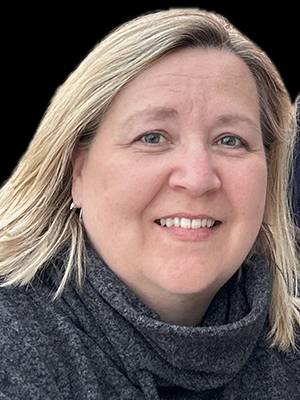Kerry Gallagher
Digital Learning Specialist
St. John’s Prep, Danvers, MA
ConnectSafely Director of K-12
What is the one thing you are really passionate about?
While in the middle and high school classrooms teaching history for the past 13 year, my passion was always about giving students a memorable experience, not just a lesson. I want children to remember how they learned about Andrew Jackson or the Maya, not just what they learned. When they work together and because they created something to be proud of, they can make these lasting memories.
With my recent career change into a Digital Learning Specialist role, I’m finding that my passion lies in cheering on teachers who are moving toward more project based, collaborative learning models. When I can work with them to develop innovative learning experiences and projects for their students; and when I can be in their classrooms helping them roll out these new plans for the first time; and when I can watch students learning while they are thinking and engaged — that is the best part of my job. I cheer on these teachers by writing articles about them, sharing images from their classrooms on Instagram, and talking about their excellent work at conferences. Not only am I celebrating their good work, I’m helping them share their best practices with other educators.
What are you 2/3 favorite apps or tools?
Students are really drawn to apps that help them learn in a more personal way. For instance, when I taught my classroom was paperless and my students loved the combination of Evernote and Skitch. Their notes were automatically date and time stamped in Evernote, so organization was a breeze. Also, when combined with Skitch, students could annotate high quality color images so they could add graphic organizers, art, photos, maps, and other media to their notes. If they happened to forget a device at school, their notes were available from any computer too. All they had to do was sign in.
At my current school, teachers and students really love Notability on the iPad for taking notes and completing activities. They add text, media, and drawings together in one note. The killer piece, though, is that they can leave themselves voice recordings explaining what they were thinking and learning when they made the note. It is metacognitive magic! World language teachers are also having students use it to record themselves speaking the language for oral expression assignments.
When it comes to really getting to know learners, I can’t get enough of digital formative assessment tools. My personal favorite is Socrative. Not only is it a privacy-conscious tool — students don’t have to make accounts to use it — it provides clear immediate results that teachers can use to adjust instruction on the fly. For formative assessment with videos, our teachers are loving eduCanon. As students watch a clip from YouTube, teacher-created questions pop up and pause the video so students can check their understanding. No more students zoning out during videos!
What is your current project?
This year, our school is working hard to roll out a fully integrated digital citizenship curriculum in all content areas at all grade levels. This is not a small project. I’ve worked closely with Julie Cremin, my colleague and also a Digital Learning Specialist at St. John’s Prep, to research, develop curriculum, and train teachers since July. We already have some fantastic examples of how teachers are bringing concepts like digital tattoo, privacy, and etiquette into their classrooms.
We are also meeting with administration and parents throughout the school year. We want all members of our school community to understand the importance of digital citizenship education when we are talking about cultivating the whole child. I’ve even had an opportunity to write about it so that other schools can learn about the model. There is much more work to be done throughout this school year and next, but Julie and I are encouraged at the progress that’s already been made.
All of this is tied very closely to the work I’ve been doing with ConnectSafely.org. After writing a couple of articles and co-authoring The Educator’s Guide to Social Media with their CEO Larry Magid, I’ve taken on a more permanent role as Director of K-12 Education. Educators are doing great things with technology and their students are benefitting. I find my work with ConnectSafely incredibly rewarding because it is helping teachers get a deeper understanding of how to use these tools to empowers their learners while acknowledging important privacy and safety concerns for our children.
Who do you admire most? Why?
First and foremost, the people I admire most are teachers who are willing to go outside their comfort zones in front of classrooms full of students. Now THAT is a huge risk. But they do it because they care so much for their students’ learning that they push themselves to redesign their work over and over. If a project or lesson doesn’t quite go as planned, they talk to their students and colleagues about it and go right back into that classroom with a new invigorated plan.
I admire our students who are willing to answer questions and create incredible projects and designs, even when they aren’t quite sure their answers are correct. When they take a chance and trust themselves, and they’re right, the rewards are incredible. When they take a chance and trust themselves, and they’re wrong, they regroup and learn and give it another shot. How many adults (besides the teachers mentioned above) do this every day? Sometimes I think our kids deserve more credit than they get for the work they do every day in school.
How do you stay current on trends and new technology?
I love writing and reading blogs that my colleagues in edtech use. Right now the first of my favorites is The Principal of Change from George Couros. George is an educator, speaker, and newly minted book author who brings both boots-on-the-ground experience and global connectedness to his insightful posts. Most of them are based on real interactions and experiences in schools and conversations with leaders from around the world. Tech is a part of his work, but his work is really about what is best in education leadership.
I love the deep research-based posts from te@chthought. Many come from Terry Heick and the eminently qualified TeachThought Staff, but other contributors have included no less than the revered Grant Wiggins. What I love the most about this blog is that it is honest about how human relationships, research, and technology strike a delicate balance in the classroom. Any educator who does not put some effort into all three areas is missing just a little something in their classroom practice.
These two blogs might not be all about tech, but there is a good reason they are at the top of my long blog list. In the end, any trend in new technology is only worth following if it enhances education relationships with colleagues and students, if it provides better learning experiences, and if it helps school and families work together for what is best for children.
 Print this post
Print this post



